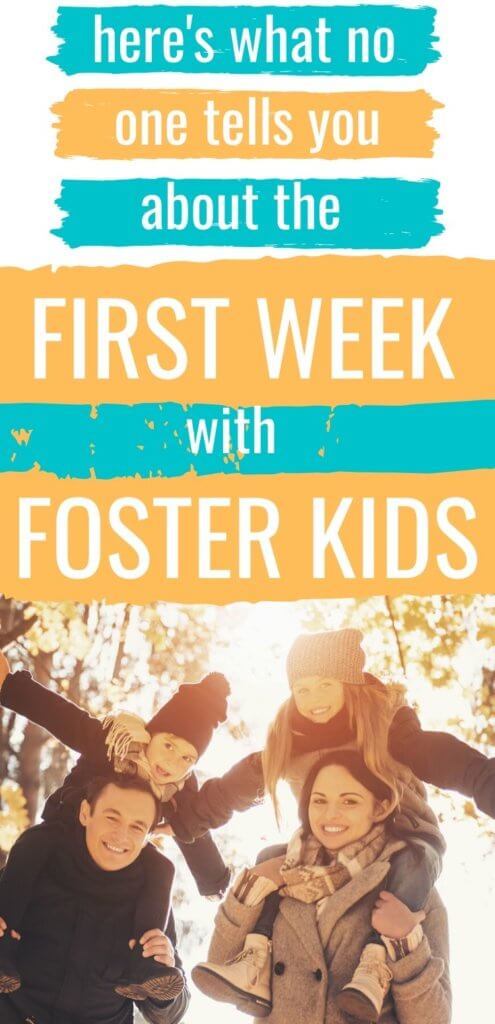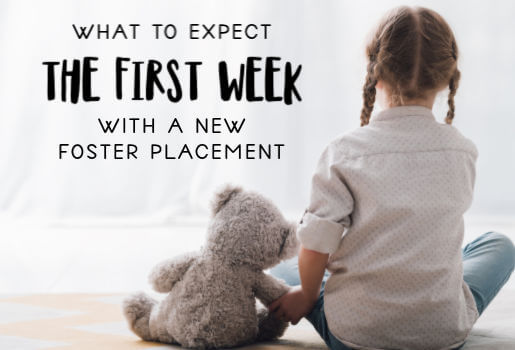Tips for Your First Week with a New Foster Child
Over the last 5 years that my family has been doing foster care we have had quite a few first weeks with kids. (Especially during the period where we did emergency placements!)
That first week is always the most chaotic, stressful, and time-consuming week of all. Here are some tips that I have learned along the way to help you with your next placement.
This post may contain affiliate links.
The Best Tips for Your First Week with a Foster Child
The First Night
The first night is always hard for kids. I have rarely had kids come to our home and sleep well. There is usually a struggle to get them to go to sleep in new surroundings.
Plus, foster children often have a lot of fear issues both because of the trauma of being removed (and possibly the situation that brought the removal) as well as the new bedroom.
I have found it helpful to have individual nightlights for each child. I like ones that clip on so if behavior issues make it hard for a child to handle a nightlight on their bed I can move it elsewhere.
I also keep a sound machine in the bedroom. I find this is helpful for blocking out some of the new strange noises that come with different surroundings.
I also establish a bedtime routine starting that very first night (if possible). Usually, we start with a bath or shower (depending on the age of the child.) Then I have the kids brush their teeth. And last, we do storytime in bed.
I usually leave some time to have conversations in bed as needed as well. Often kids are needing to process what has happened as well as their emotions. They are often feeling scared, sad, and confused and bedtime tends to bring those emotions to the surface.
One tool that has been really helpful for my foster kids is using these calm down cards that can be left by their bedside. I print each child out a copy and pick out one or two of the coping skills to practice with them. This helps calm them down in the moment and also gives them a tool to use throughout the night.
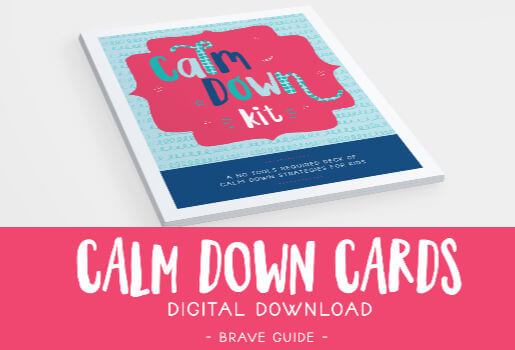
Expect Lots of Appointments
The first week usually entails multiple contacts with the social worker. If you are working with an agency, you will most likely also have a visit with their social worker.
You will also need to have a medical checkup in the first few days. It is really helpful to have already researched doctors that take state insurance and are accepting new patients.
I created this editable PDF Foster Care Resource Sheet that has room for all of the contact info of every resource you may need (and then some!)
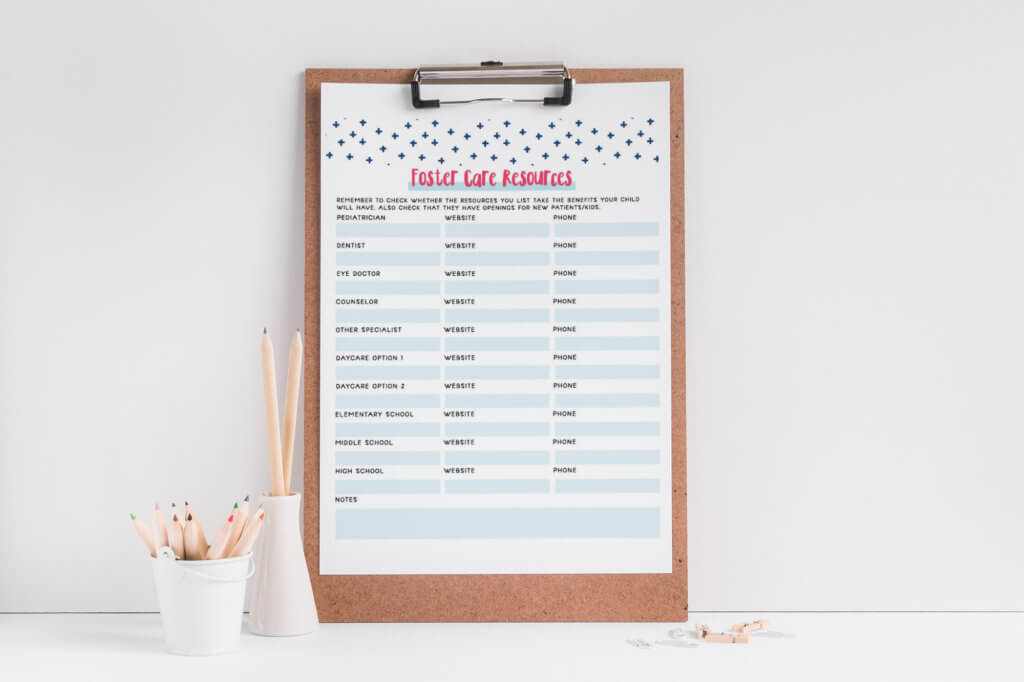
You can download that free in the parenting resource library. Having those numbers handy is a lifesaver when you are trying to keep your head above water that first week!
School
If you have school-aged children, then addressing their schooling will be one of the first things you will need to work on.
Depending on the situation as well as your state’s regulations, you will either need to change contact info at the children’s current school or get them enrolled in your local school.
Enrolling kids generally requires filling out some paperwork and presenting your placement paperwork. Every school that I have worked with has always been aware of the situation and has been very helpful in getting us set up.
Our current placement came during the Corona Virus Shutdown which has posed an interesting challenge. Trying to figure out teacher contacts, distance learning, and so on remotely has been challenging. We did our best during the first week but I also allowed lots of room for just doing our best and not stressing about having every assignment perfect.
Daycare
If you have younger children or if you need after school care, you will want to get daycare set up as soon as possible. There are two things that go into setting up daycare.
First, you need to get CPS approval. Start on this right away as it can often take a while to get things going. You may also need to follow up multiple times.
This is one area where it is important to be a squeaky wheel. I have occasionally had social workers who have made daycare a priority, but, unfortunately, that has been the exception – not what usually happens.
The second aspect of setting up daycare is contacting daycare centers looking for an opening. This part is, to be honest, pretty frustrating.
You can try to do this beforehand but without knowing what age your placement will be and not having a specific start date, I haven’t had much success in centers being willing to hold a spot for me,
You can do your research beforehand though and get a list from the state of daycares that accept CPS kids. (This can be different than kids who are just on State assistance.) Make a list with contact numbers so that you can quickly start calling once you get your placement.
I use my Foster Care Resource Sheet to collect all of this contact info. You can download that for free here.
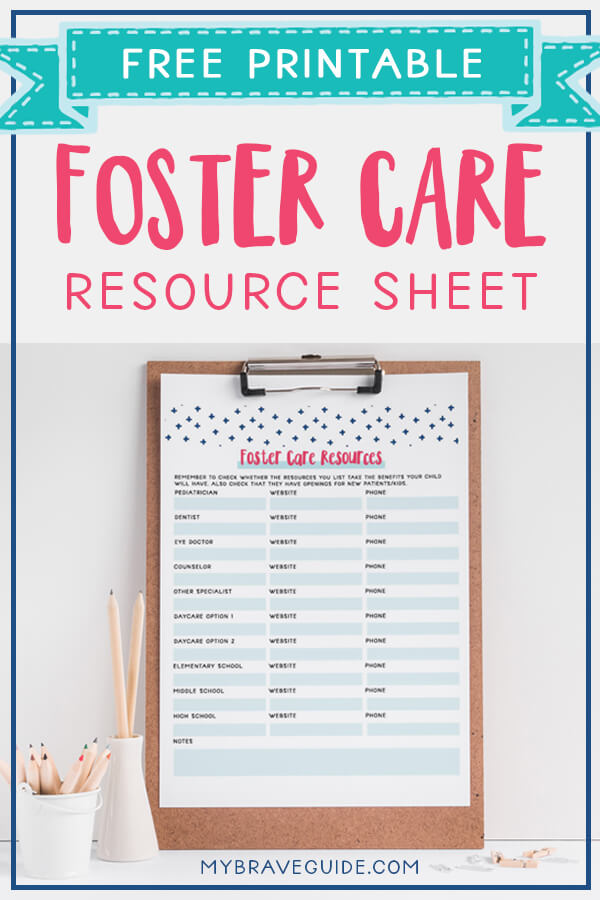
Clothing/Basic Needs
Clothing can be an interesting issue when you first get a placement. I have had kids come to us with just the clothes on their backs. I have also had kids come with an entire carload full of belongings (including an adult-sized bike for a 6-year-old child!)
More often than not, our foster children have shown up with a bag of hastily collected clothes that are in pretty bad shape, smell really bad, and mostly don’t fit.
Be prepared to go out on a shopping trip within the first day or two. You can also research organizations in the area that may have clothes closets for foster kids where you can get items donated. This can be really helpful when you need to pull together an entire wardrobe and the stipend from your agency or CPS just isn’t going to cover it all.
I have tried keeping a stock of clothing on hand but inevitably our placements show up and need a different size or don’t like the style of clothes I have.
These days, I donate my bio-kids outgrown kids to the foster closet and then utilize them to acquire the correct sizes when we get a new foster placement. That way I don’t have to store bins of clothes.
Supplies on Hand
You will want to keep a stock of some basic supplies on hand for that first night. Having to run out to buy toothbrushes at 10 pm is not something that you are going to want to do!
I like having a few toiletry kits put together with children’s toothpaste, a kid’s toothbrush, a comb, a hairbrush, and some kid’s soap/body wash.
If you are open for infants, you will need more immediate supplies. Check out this post on What You Really Need to Foster a Baby for a detailed list.
Behavior
The first week can also bring some interesting behaviors from your new foster children. We have experienced two different styles over the years.
First, and most common, is that the first week or two is kind of a honeymoon period. The child is generally behaving well and being somewhat reserved. As time goes on and they get more comfortable, you will start to see their true personality come out more and start seeing behavior issues such as tantrums, fighting, crying, depression, etc.
The second thing we have seen is children that come in with a lot of behavior issues and have clearly not ever experienced having a routine, boundaries, and so on. These kids can be tough at first because they are often very independent (so they are getting into everything) and they really resist boundaries at first.
With both types of behavior, I have found it very important to set up routines and boundaries. Kids really need these in order to feel safe.
Depending on the age of the child using tools such as behavior/sticker charts or other rewards systems are really helpful. I have really liked the system in the book Your Defiant Child by Russel A Barkley. It is simple and easy to use in the midst of the chaotic first week.
I have found that the more formal spaces I can create to use positive reinforcement, the better things go. There are often a lot of “no, don’t do that’s” the first week as kids test boundaries and explore their new surroundings.
If you can aim for 4-5 positive acknowledgments of behavior to each 1 “no” things will go much smoother!
One other thing to consider the first week is to potentially work on setting up counseling and/or behavioral assessments. There are often waitlists for these services so the sooner you get on the list, the sooner you and your kids will get help.
Preparing Bio-Kids
One final item to consider is preparing your bio-kids if you have them. The first week is often pretty hard for them.
Your time and attention will be focused much heavier on the new additions. As much as you try to spread yourself around, it is pretty much impossible to achieve a perfect balance the first week.
I make sure to spend extra time with my kids prior to receiving a new placement. I also discuss expectations and make arrangements when possible for them to have special playdates during the first week.
Another difficulty that can arise depending on your children is that there may be a lot of disagreements around toys and belongings. Many of our foster children have come into our home not having normal behaviors around taking care of objects and being careful. My son loves Legos and he has had many lego creations broken by foster kids who were just trying to “look.”
I have learned to have my kids sort through their belongings and anything that they don’t want to share or feel is too fragile for a rough child, they put away in their closets. We have the ability to lock their closets which is really helpful. If that scenario doesn’t work for you, I would highly encourage you to find somewhere safe for your children’s special items.
Final Thoughts on Your First Week with a New Foster Child
The first week with a new foster kid will be a rollercoaster of emotions for everyone involved. Make sure to work in space to take little breaks to recharge.
You may get to a place during the week where everything will feel way too hard and you will wonder why you have signed up for this. You may even consider calling CPS and telling them you are done. Remind yourself that things will get easier and just keep breathing!
Sending you Love and Light,
~Ruth
